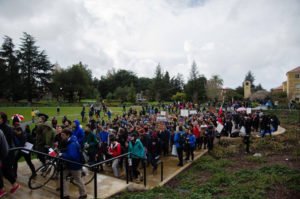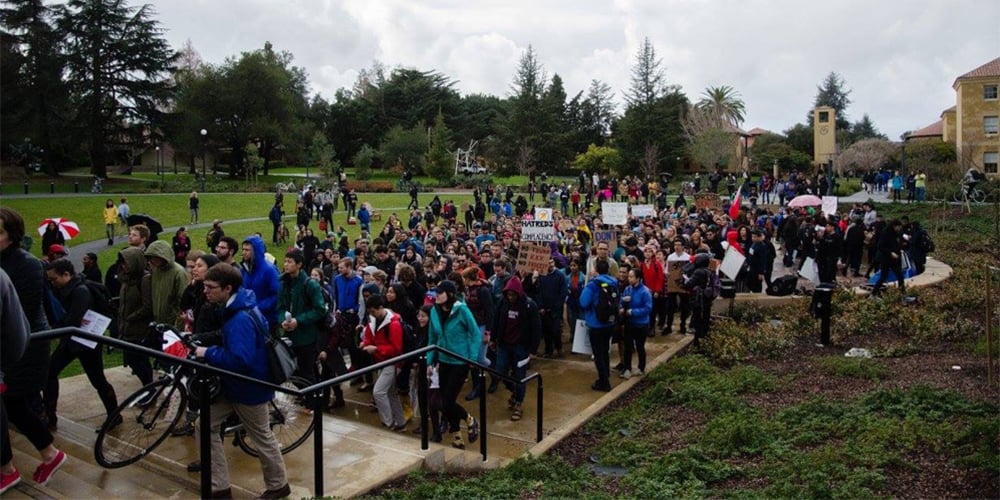As students new and old alike arrived at Stanford and began returning to their academic routines over the last few weeks, many were met with posters advertising a group that they may not have even known existed.
“Fight the Right! Build the Left! Join the Socialists!” the signs urged.

The socialists in question were the Stanford branch of the International Socialist Organization (ISO) — a leftist political group that advocates revolution against capitalism in America and around the world.
The group’s politics are not exclusively economics-focused, however.
“On campuses generally, and specifically on [the] Stanford campus, we’re trying to be the home for the political left, basically,” said Bora Erden ’17 M.S. ’18, the Stanford wing’s financial officer. “Like, there are a lot of identity groups and there are a lot of single-issue groups on campus, but there aren’t that many that take on a more holistic outlook at radical politics, and so that’s kind of what we’re trying to be. We want to be a place where people can come and have a discussion about anything, and sort of have this socialist framework to apply to current issues.”
Ideologically part of the Trotskyite tradition, the ISO identifies capitalism as the root cause of any number of social justice issues — not just economic inequality but also war, imperialism, racism, sexism, xenophobia and homophobia — and advocates for an upending of that system.
As part of the ISO’s Bay Area District alongside groups in Berkeley, Oakland and San Francisco, the Stanford branch endorses the same big-picture views as the rest of the collective. Yet it also addresses issues specific to the University.
Members said they are critical of the negative light in which they believe Stanford economics courses tend to frame social welfare programs, as well as of the school’s labor conditions.
“Stanford’s relation to, for example, the janitorial staff at [the school] is very off-putting, honestly,” Erden said. “They just subcontract and then just say, ‘Oh, we’re not doing anything, [the subcontractors are] in charge of it.’ So we have to go after the subcontractor.”
In an email response to these criticisms, University spokesperson E.J. Miranda noted that Stanford contractors are required to comply with the University’s Living Wage Policy, although “the policy does not cover contractor employees that are under a bargaining unit agreement.” He also pointed to union negotiations last year which he said Stanford worked with the Student and Labor Alliance (SALA) to influence in the favor of Stanford custodians.
“Stanford utilizes a number of contractors to provide various services to the university and we are mindful of the quality of the working situation of their employees,” Miranda said.
In addition to labor-related complaints, the ISO also takes issue with Stanford’s resident conservative think tank, the Hoover Institution, as well as the University’s close relationship with the Silicon Valley private sector and capitalist industries like financing and consulting.
“We’re like the conservative bastion of the Bay Area,” Erden said of Stanford.
However, its opposition to conservative politics doesn’t mean the ISO will ally with just any liberal organization.
“We do not support candidates of capitalist parties like the Democrats or the Republicans,” explains the national organization in its online “Socialist Worker” publication. “We support genuine left-wing candidates and political action that promotes independence from the corporate-dominated two-party system in the U.S.”
The Stanford chapter of the ISO reflects this distinction as well. For instance, they participated in a mock presidential debate with other students leading up to the elections last November — but where the Stanford Democrats represented Hillary Clinton and Stanford for Bernie represented Bernie Sanders, the ISO spoke in favor of Green Party candidate Jill Stein.
The difference, Erden said, is all about reform versus revolt.
“Basically, it comes down to whether you believe that you can pass laws to make capitalism go away,” he said. “We believe that capitalism is at the root of exploitation and oppression; if you want to get rid of capitalism, the electoral system is not gonna let go [just] like that.”
That isn’t to say that they don’t see some common ground with the Democratic Party. But the extent to which these commonalities translate into meaningful coalition-building, at least at Stanford, is hard to gauge.
“The Stanford Democrats and the [Stanford] ISO both agree that fighting injustice in every form should be a top priority of our nation’s political institutions,” wrote Jacob Randolph, the Campaigns and Elections Team Chair for the Stanford Democrats, in an email to The Daily. “Our organization has and will continue to work with and co-sponsor events with the [Stanford ISO] that focus on engaging the Stanford student body in productive discourse surrounding the critical issues impacting our cities, states, and country.”
“Our organizations may disagree on the policies and path used to solve these societal problems,” he added, “but it is imperative that we continue to keep students politically informed and aware.”
When asked whether there was room for collaboration between the two groups on Medicare for All and higher minimum wage — two policies Erden had identified as representing potential areas of overlap between the ISO and certain Democrats — Randolph said that his group was still working to “develop the platform of issues that [they] plan on focusing on for the upcoming year.”
Instead, he emphasized “fight[ing] against the current administration’s policies that target members of marginalized communities” and “working to show that the younger generation does have [a] powerful voice” in politics.
Even if the two groups were to collaborate on policy work, at the end of the day the ISO still views that sort of change as only providing temporary relief from the bigger problem: global capitalism.
And as its members begin a new school year — the first one set to occur entirely under the Trump administration — they work not for a band-aid but a full-blown organ transplant.
Erden admitted this would be a long struggle but said it is one the group feels is worth having.
“We’re very far from being in a place where there’s a mass working-class movement,” Erden conceded. “But this is where we are, and we have to go forwards from there.”
Contact Brian Contreras at brianc42 ‘at’ stanford.edu.
